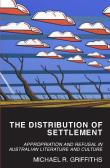 1744560635628865954.jpg
1744560635628865954.jpg
 The Distribution of Settlement : Appropriation and Refusal in Australian Literature and Culture
multi chapter work
The Distribution of Settlement : Appropriation and Refusal in Australian Literature and Culture
multi chapter work
 1744560635628865954.jpg
1744560635628865954.jpg
 The Distribution of Settlement : Appropriation and Refusal in Australian Literature and Culture
multi chapter work
The Distribution of Settlement : Appropriation and Refusal in Australian Literature and Culture
multi chapter work
'Settler representations of Indigenous culture and identity weigh heavily on the way Indigenous people tell their stories in the present. These representations affect the way Indigenous writers themselves operate to represent themselves and their people. The rendering visible of Indigenous culture involves a fraught history riven with appropriation, misrepresentation and material and discursive forms of violence.
'The Distribution of Settlement tells a partial story about the effect of these histories within Australian literature and culture. Tracking such cases of appropriation and misrepresentation in white Australian writing from the middle of the twentieth century, the book also turns to the legacy of these acts on and in contemporary Aboriginal writers as diverse as Kim Scott, Alexis Wright, Tony Birch and Tara June Winch.'
Source: Publisher's blurb.
Contents :
Introduction: Refusing Settler Artifacts 1
Part One 29
Appropriation 31
Bastardy 64
Mumae’s Gaze 89
Part Two 129
The White Gaze and its Artifacts 131
Part Three 165
Opacity and Refusal 167
Refusing Capricornia 186
Need I Repeat? 207
Conclusion 226
'In recent years, the study of Aboriginal literatures has moved from a marginal interest of Australian literature to a site of global inquiry. Due to limited Aboriginal representation in the formal institutions of literary studies, this shift has arguably not coincided with sufficient reciprocal interpretive mechanisms capable of situating the Aboriginal text in a dynamic relationship with Aboriginal culture. As such, many of these discourses have reconstituted culturally inappropriate anthropological mechanisms in their engagements with contemporary Aboriginal literatures (Araluen, ‘Shame’). The unstable entanglements of power, sovereignty and exclusion that frame the Australian conditions of settler coloniality are manifest in the institutions and disciplines that teach, publish, and interpret Aboriginal literature. In the space of Indigenous research discourse and practice, Ngati Awa and Ngati Porou academic Linda Tuhiwai Smith’s pioneering work on decolonial Indigenous methods and practices, Decolonising Methodologies: Research and Indigenous Peoples (1999), demonstrates that the concept of the discipline is not only an organising system of knowledge but also a system of organising people and bodies. She argues that the intellectual productions of nineteenth-century imperialism, including notions of civilisation and the Other, are bound to and assert geographic and economic forces of appropriation, expropriation and incorporation (69). These knowledges not only form academic disciplines but have also been used to discipline the colonised through exclusion, marginalisation and denial.' (Publication abstract)
'In recent years, the study of Aboriginal literatures has moved from a marginal interest of Australian literature to a site of global inquiry. Due to limited Aboriginal representation in the formal institutions of literary studies, this shift has arguably not coincided with sufficient reciprocal interpretive mechanisms capable of situating the Aboriginal text in a dynamic relationship with Aboriginal culture. As such, many of these discourses have reconstituted culturally inappropriate anthropological mechanisms in their engagements with contemporary Aboriginal literatures (Araluen, ‘Shame’). The unstable entanglements of power, sovereignty and exclusion that frame the Australian conditions of settler coloniality are manifest in the institutions and disciplines that teach, publish, and interpret Aboriginal literature. In the space of Indigenous research discourse and practice, Ngati Awa and Ngati Porou academic Linda Tuhiwai Smith’s pioneering work on decolonial Indigenous methods and practices, Decolonising Methodologies: Research and Indigenous Peoples (1999), demonstrates that the concept of the discipline is not only an organising system of knowledge but also a system of organising people and bodies. She argues that the intellectual productions of nineteenth-century imperialism, including notions of civilisation and the Other, are bound to and assert geographic and economic forces of appropriation, expropriation and incorporation (69). These knowledges not only form academic disciplines but have also been used to discipline the colonised through exclusion, marginalisation and denial.' (Publication abstract)